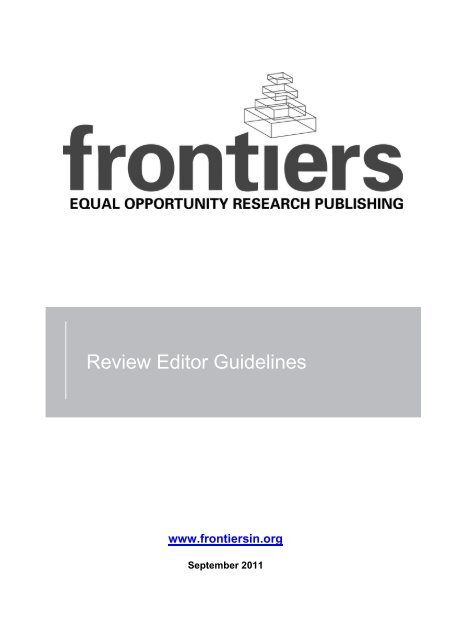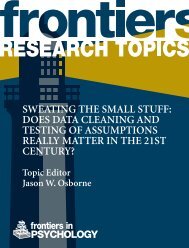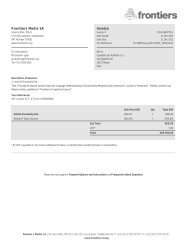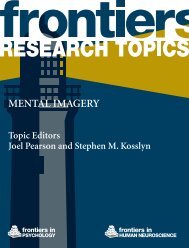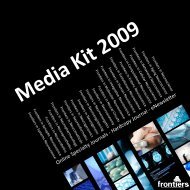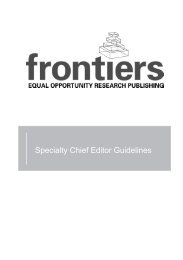Review Editor Guidelines - Frontiers
Review Editor Guidelines - Frontiers
Review Editor Guidelines - Frontiers
You also want an ePaper? Increase the reach of your titles
YUMPU automatically turns print PDFs into web optimized ePapers that Google loves.
<strong>Review</strong> <strong>Editor</strong> <strong>Guidelines</strong><br />
www.frontiersin.org<br />
September 2011
Table of contents<br />
Table of Contents<br />
1. About <strong>Frontiers</strong> ................................................................................................................... 3<br />
2. <strong>Frontiers</strong> <strong>Editor</strong>ial Boards ................................................................................................. 4<br />
2.1 Numerical Goals ......................................................................................................... 5<br />
3. Your Role as <strong>Review</strong> <strong>Editor</strong> ............................................................................................... 6<br />
3.1 Your Role in the Peer-<strong>Review</strong> ................................................................................... 6<br />
3.1.1 <strong>Review</strong> <strong>Guidelines</strong> ................................................................................................... 6<br />
3.1.2 Get Familiar with the Online <strong>Review</strong> ....................................................................... 9<br />
3.2 Organize a Research Topic ..................................................................................... 11<br />
Organize Your Own Research Topic!.................................................................................. 11<br />
4. Article Publishing Fees .................................................................................................... 12<br />
4.1 Article Publishing Fees ........................................................................................... 12<br />
4.2 <strong>Frontiers</strong> Publishing Grant and Waivers ............................................................... 13<br />
4.3 What do the Fees Cover? ........................................................................................ 13<br />
5. Contacts ............................................................................................................................ 14<br />
www.frontiersin.org 2
<strong>Frontiers</strong> <strong>Editor</strong>ial boards<br />
1. About <strong>Frontiers</strong><br />
Welcome to <strong>Frontiers</strong>!<br />
<strong>Frontiers</strong> is more than just an Open Access publisher: it is a pioneering approach to the world of<br />
academia, catapulting scholarly publishing into a new generation.<br />
1 st Generation: the common “Reader-Pay” or “Restricted Access” Model<br />
2 nd Generation: the improved “Author-Pay” or “Open Access” Model<br />
3 rd Generation: the collaborative “Open Repository” or “Universal Access” Model<br />
4 th Generation: the revolutionary “<strong>Frontiers</strong> Model” or “Equal Opportunity” Model<br />
The concept is based on equal-opportunity validation, evaluation, and publishing of research<br />
articles, as well as free dissemination of scholarly research knowledge. <strong>Frontiers</strong> is a publishing<br />
concept created “by researchers for researchers”. At the same time, it is a new “community<br />
journal” concept, which offers a comprehensive solution to the publishing problems in scholar<br />
communities.<br />
<strong>Frontiers</strong> is:<br />
<br />
<br />
<br />
<br />
The first tiered journal series setup to automatically and democratically distil scientific<br />
excellence and social relevance,<br />
The first real-time journal series for interactive review to increase the speed, efficiency<br />
and quality of the peer-review process,<br />
The first community journal with participative architecture for authors and readers to<br />
present their work, ideas, opinions and activities,<br />
The first author services journal where authors can track, enhance, collaborate,<br />
promote, and build support for their research.<br />
Thank you for joining! It is a privilege to have you on board.<br />
Please, take 15 minutes to get to know <strong>Frontiers</strong> by reading these guidelines –<br />
this will save you an enormous amount of time later, and will guarantee the<br />
success of your specialty.<br />
www.frontiersin.org<br />
3 www.frontiersin.org
About this Package<br />
2. <strong>Frontiers</strong> <strong>Editor</strong>ial Boards<br />
The <strong>Editor</strong>ial Boards at <strong>Frontiers</strong> are composed by the 4 following editorial roles:<br />
1. A Field Chief <strong>Editor</strong> (FCE), who invites and appoints ~20 Specialty Chief <strong>Editor</strong>s;<br />
2. Each of the Specialty Chief <strong>Editor</strong>s (SCE) in turn invites and appoints ~10-15<br />
Associate <strong>Editor</strong>s.<br />
3. Each Associate <strong>Editor</strong> (AE) invites and appoints ~10-15 <strong>Review</strong> <strong>Editor</strong>s (you).<br />
4. The <strong>Review</strong> <strong>Editor</strong>s (RE) are the referees of the articles.<br />
Each editor is in charge of overseeing the duties of the editors he/she appointed.<br />
A journal’s editorial board will be complete with approximately 2000-3000 editors (note that,<br />
unlike other journals, <strong>Frontiers</strong> includes <strong>Review</strong> <strong>Editor</strong>s into the <strong>Editor</strong>ial Boards, listed with their<br />
name and affiliation).<br />
www.frontiersin.org 4
<strong>Frontiers</strong> <strong>Editor</strong>ial boards<br />
2.1 Numerical Goals<br />
Month<br />
1<br />
Month<br />
2<br />
Month<br />
3<br />
Month<br />
4<br />
Month<br />
5<br />
…<br />
Month<br />
12<br />
EDITORIAL BOARDS<br />
Specialty Chief<br />
<strong>Editor</strong>s<br />
1 …<br />
Associate <strong>Editor</strong>s 10 20 …<br />
<strong>Review</strong> <strong>Editor</strong>s - 50 100 200 …<br />
ARTICLES<br />
Specialty Grand<br />
Challenges<br />
1 …<br />
Inaugural Articles<br />
SCE: 1 SCE: 1<br />
- -<br />
(submitted)<br />
AE: 10 AE: 20<br />
- … - -<br />
Total Articles<br />
(published)<br />
- - - - 10 …<br />
10-15<br />
per<br />
month<br />
Month<br />
24<br />
Sustainable:<br />
120 per year<br />
Successful:<br />
180 per year<br />
= numerical target reached<br />
5 www.frontiersin.org
Checklist<br />
3. Your Role as <strong>Review</strong> <strong>Editor</strong><br />
Your primary role as <strong>Review</strong> <strong>Editor</strong> is to referee the peer-reviews of submitted manuscripts.<br />
Besides refereeing manuscripts, as an active member of a <strong>Frontiers</strong> <strong>Editor</strong>ial Board you are<br />
recommended to contribute to the success of your Specialty by:<br />
Submitting your articles on regular bases<br />
Organizing a Research Topic (recommended within the first year)<br />
3.1 Your Role in the Peer-<strong>Review</strong><br />
<strong>Review</strong> <strong>Editor</strong>s are the referees of manuscripts during the peer-review process. Along with<br />
Associate <strong>Editor</strong>s, they are the key persons of the <strong>Frontiers</strong> <strong>Review</strong>, since they are responsible<br />
for certifying the validity and accuracy of publications, and for helping authors to improve the<br />
quality of their research.<br />
The highest possible quality and objective review of articles is the foundation of this publishing<br />
system. <strong>Frontiers</strong> prides itself in its objective high quality review system and the role of review<br />
editors is, therefore, central in <strong>Frontiers</strong>.<br />
<strong>Review</strong> editors are acknowledged publicly on all published articles<br />
3.1.1 <strong>Review</strong> <strong>Guidelines</strong><br />
<strong>Frontiers</strong> <strong>Review</strong>s significantly redefine the assignments for both authors and editors in order to<br />
guarantee the most accurate, efficient and impartial reviews in academic publishing.<br />
The mandate for review editors is to ensure that the results are valid, the analysis is flawless<br />
and the quality as high as possible. The significance of articles is automatically evaluated postpublication.<br />
<strong>Frontiers</strong> reviews typically consist of two phases:<br />
1. Independent <strong>Review</strong>: The <strong>Review</strong> <strong>Editor</strong>s assess the paper independently from each<br />
other and the authors, according to a standardized review template.<br />
2. Interactive <strong>Review</strong>: Authors and <strong>Review</strong> <strong>Editor</strong>s can interact with each other through<br />
real-time comments in the discussion forum. The Associate <strong>Editor</strong> (and if required the<br />
Specialty Chief <strong>Editor</strong>) can enter the <strong>Review</strong> Forum and oversee this process.<br />
Find this content also on the <strong>Frontiers</strong> website in your account.<br />
The <strong>Review</strong> Process<br />
Following manuscript submission, a whole board invitation is send to the Associate <strong>Editor</strong>s of<br />
the relevant <strong>Frontiers</strong> Specialty to take on the manuscript editorial assignment. After a<br />
preliminary content check, the assigned Associate <strong>Editor</strong> may either decide to send the<br />
manuscript out for review or recommend it for immediate rejection to the Specialty Chief <strong>Editor</strong>.<br />
In the latter case, the Specialty Chief <strong>Editor</strong> may confirm the Associate <strong>Editor</strong>’s<br />
recommendation of immediate article rejection due to the following reasons:<br />
www.frontiersin.org 6
Checklist<br />
<br />
<br />
<br />
An objective error (generally accepted by the community and not one that would be<br />
debatable by some);<br />
An excessive amount of language errors;<br />
Lack of research quality or ethical standards.<br />
The Specialty Chief <strong>Editor</strong> may, nevertheless, override the Associate <strong>Editor</strong>’s recommendation<br />
and decide that the manuscript deserves being reviewed, in which case he/she will assign the<br />
article to a new Associate <strong>Editor</strong> who agrees to send the article for review.<br />
The Associate <strong>Editor</strong> then assigns the article to at least two <strong>Review</strong> <strong>Editor</strong>s, either selected from<br />
the <strong>Frontiers</strong> Board of <strong>Review</strong> <strong>Editor</strong>s or appropriately recruited among the experts in the area.<br />
If the <strong>Review</strong> <strong>Editor</strong>s have not been assigned within 5 days, a whole board invitation is sent to<br />
the <strong>Review</strong> <strong>Editor</strong>s to fill in the position.<br />
Independent <strong>Review</strong> Phase<br />
The <strong>Review</strong> <strong>Editor</strong>s shall submit the standardized Independent <strong>Review</strong> Report via the online<br />
review forum. The associate editor is automatically notified as soon as each of the Independent<br />
<strong>Review</strong> Reports is submitted.<br />
During the Independent <strong>Review</strong> phase, the review editors assess the paper independently from<br />
each other and the authors, according to our standardized review template.<br />
Once all <strong>Review</strong> <strong>Editor</strong>s have submitted an Independent <strong>Review</strong> Report, the Associate <strong>Editor</strong> is<br />
responsible for activating the successive phase of the <strong>Frontiers</strong> <strong>Review</strong>, i.e. the Interactive<br />
<strong>Review</strong> Forum. Even if the Independent <strong>Review</strong> Reports are unfavorable to the authors, the<br />
Interactive <strong>Review</strong> Forum must be activated to allow authors the opportunity of rebuttal.<br />
Interactive <strong>Review</strong> Phase<br />
Once the associate editor activates the Interactive <strong>Review</strong> Forum, authors are immediately<br />
notified to enter the forum, where they are able to view the review comments, and have up to<br />
two months to prepare responses and/or a revised manuscript resubmission, if necessary.<br />
The associate editor monitors the discussions occurring between authors and review editors<br />
within this forum, and ensures not only the timeliness, but also the constructiveness of the<br />
participants’ interaction. Should a dispute arise at this stage, the associate editor must act as a<br />
mediator, working with all parties involved to resolve the issues and even inviting new <strong>Review</strong><br />
<strong>Editor</strong>s for further opinions. If the disagreement persists, the specialty Chief <strong>Editor</strong> is then<br />
obliged to enter the Interactive <strong>Review</strong> Forum, examine the situation and take a final decision,<br />
as to whether the review should be ended by article rejection or continued by a new set of<br />
editors.<br />
When a disagreement cannot be resolved to the satisfaction of a <strong>Review</strong> <strong>Editor</strong>, the latter is in<br />
full right to withdraw from the review at any phase, in which case the Associate <strong>Editor</strong> will invite<br />
another <strong>Review</strong> <strong>Editor</strong>.<br />
At this stage, a manuscript may be rejected for the following reasons:<br />
an objective error is found that cannot be corrected;<br />
experiments are found to be invalid;<br />
authors are unable or unwilling to address issues raised by the <strong>Review</strong> <strong>Editor</strong>s.<br />
The review is complete once all review comments are addressed to the <strong>Review</strong> <strong>Editor</strong>s'<br />
satisfaction.<br />
7 www.frontiersin.org
Checklist<br />
Article Acceptance/Rejection<br />
If the <strong>Review</strong> <strong>Editor</strong>s are satisfied with the authors’ efforts at amending the manuscript, they<br />
then briefly finalize their Interactive <strong>Review</strong> Reports, which automatically notifies the Associate<br />
<strong>Editor</strong> of article acceptance. The Associate <strong>Editor</strong> accepts the final version of the manuscript<br />
within five days, and this action does not require the approval of the Specialty Chief <strong>Editor</strong>.<br />
Once a manuscript is accepted, the authors receive an automated notification informing them of<br />
the acceptance and the provisional PDF will instantly appear online. <strong>Review</strong> <strong>Editor</strong>s are invited<br />
to publish a one-page joint commentary to be linked to the published article, however this is not<br />
mandatory. Payment of the publication fee is required within thirty days of acceptance and<br />
necessary before final publication of the manuscript.<br />
Articles can only be rejected by the Chief <strong>Editor</strong>, while the Associate <strong>Editor</strong> who handles an<br />
article can only recommend rejecting an article. The Chief <strong>Editor</strong> may override an Associate<br />
<strong>Editor</strong>’s recommendation to reject the article and insist to call in further <strong>Review</strong> <strong>Editor</strong>s to<br />
continue the review process.<br />
The Assignment of Associate and <strong>Review</strong> <strong>Editor</strong>s to a Manuscript<br />
A key philosophy at <strong>Frontiers</strong> is to constantly move responsibility for publishing scientific papers<br />
down rather than up the chain. It would be a big step for publishing if we could increase the<br />
integrity of the peer-review system! At the same time, we have a huge responsibility to authors<br />
when their valuable work is submitted. Unnecessary time delays are not acceptable.<br />
In all editing/review invitations, the Associate/<strong>Review</strong> <strong>Editor</strong>s are requested to confirm that they<br />
don’t have any conflicts of interest. Moreover, to further guarantee the transparency of the<br />
review, the names of the Associate and <strong>Review</strong> <strong>Editor</strong>s involved are disclosed on all published<br />
articles, without exceptions.<br />
The assignment of <strong>Review</strong> and Associate <strong>Editor</strong>s to the review of a manuscript is composed of<br />
the following steps:<br />
1. During submission, the authors indicate an Associate <strong>Editor</strong> whom they trust to be both<br />
knowledgeable and unbiased for editing their manuscript.<br />
2. The authors may list up to three <strong>Review</strong> <strong>Editor</strong>s who might have a conflict of interest to<br />
be excluded from the review process.<br />
3. The Associate <strong>Editor</strong> selected by the authors is asked to edit the manuscript. If the<br />
Associate <strong>Editor</strong> does not accept this invitation within two days, the journal’s entire<br />
Associate Board is invited.<br />
4. The first Associate <strong>Editor</strong> to respond is assigned to edit the manuscript.<br />
5. The Associate <strong>Editor</strong> has seven days to assign two <strong>Review</strong> <strong>Editor</strong>s.*<br />
6. If two <strong>Review</strong> <strong>Editor</strong>s have not accepted after a seven-day delay, the journal’s entire<br />
<strong>Review</strong> Board is invited. Those <strong>Review</strong> <strong>Editor</strong>s excluded by the authors are excluded<br />
from this invitation.<br />
7. The Associate and Chief <strong>Editor</strong>s can, at any time, invite additional <strong>Review</strong> <strong>Editor</strong>s<br />
and/or revoke those who have accepted as deemed necessary.<br />
The general guidelines for inviting Associate and <strong>Review</strong> <strong>Editor</strong>s to join the boards invoke the<br />
recruitment of top ranking researchers in terms of number of papers published and citation<br />
www.frontiersin.org 8
Checklist<br />
records. Indeed, our records show that the <strong>Frontiers</strong> editorial boards are composed exclusively<br />
of the top scientists worldwide.<br />
Once the editors are nominated they should be trusted. At <strong>Frontiers</strong>, thanks to our top-ranking<br />
editors, they can be trusted. Of course, none of us are perfect and we need controls in place to<br />
ensure that the system does not falter. <strong>Editor</strong>s can be revoked and additional ones assigned if<br />
corrective measures are needed. However, we trust that we all know how to make good<br />
decisions - and fix the mistakes we make.<br />
* Exception is made only in cases where the article is subject to a short peer review and therefore may be reviewed by<br />
the Associate <strong>Editor</strong> alone.<br />
3.1.2 Get Familiar with the Online <strong>Review</strong><br />
Below are some screens that show you how to access online your review management page<br />
and carry out your tasks as <strong>Review</strong> <strong>Editor</strong>.<br />
9 www.frontiersin.org
Checklist<br />
www.frontiersin.org 10
Checklist<br />
3.2 Organize a Research Topic<br />
Research Topics have become very popular trademarks of the <strong>Frontiers</strong> Journals Series: they<br />
are a collection of at least ten articles, all centered on a particular research topic (including<br />
conferences and workshops).<br />
A Research Topic can be a greatly impacting set of publications, unifying the efforts of some of<br />
the best researchers and encompassing the latest advances in a hot topic – a broad<br />
perspective bringing together key methods and results.<br />
Organize Your Own Research Topic!<br />
Hosting a Research Topic is a great opportunity to boost the visibility of your research interests<br />
and provide a broad perspective on the latest advances in your area. This is also an occasion to<br />
unite the best researchers in your area and intensify collaborations.<br />
The <strong>Frontiers</strong> <strong>Editor</strong>ial Office shall assist you in every step of the organization, in order to<br />
maximize the final impact while minimizing your concerns.<br />
The main steps in hosting a Research Topic are:<br />
<br />
<br />
<br />
<br />
<br />
<br />
Define the overall structure of the Research Topic (title, description, and list of top<br />
colleagues you would like to contact)<br />
Send a call for participation to your top colleagues (recommended).<br />
Select a minimum of 10 abstracts submitted by your colleagues and spontaneous<br />
submitters.<br />
Set a series of deadlines for submission of the full article and reminders.<br />
Manage the review process for all contributing articles.<br />
Follow up very carefully to make sure everybody is on track.<br />
The publishing fee for authors is €900. All publishing fees are reported in Sec.4.<br />
Contact the editorial office at researchtopics@frontiersin.org for more detailed information.<br />
You can find all details and examples of past Research Topics on:<br />
http://frontiersin.org/AboutSpecialTopic.aspx<br />
11 www.frontiersin.org
Appendices<br />
4. Article Publishing Fees<br />
To enable open access to all articles, <strong>Frontiers</strong> has adopted the author-pay model whereby<br />
authors or research sponsors cover the costs associated with the processing and publication of<br />
their articles. <strong>Frontiers</strong> will strive to keep costs as low as possible to ensure that publication<br />
costs do not become an obstacle to publishing.<br />
4.1 Article Publishing Fees<br />
An article publishing fee of €2,000 is the full charge to cover the costs associated with editing,<br />
publishing, archiving, and evaluation of the article, as well as maintaining the most advanced<br />
website in online publishing, covering the costs of climb-tiering and rejected articles, and<br />
supporting the <strong>Frontiers</strong> academic environment. There are several subsidies and discounts<br />
available. Please refer to the table below for complete information on <strong>Frontiers</strong> fees (all fees are<br />
in Euros - €).<br />
Article Type<br />
Article<br />
Publishing<br />
Fee<br />
<strong>Frontiers</strong> subsidy for<br />
ALL Authors<br />
Subsidy<br />
Final Fee<br />
Additional discounts for<br />
Chief and Associate<br />
<strong>Editor</strong>s*<br />
Additional<br />
Final Fee<br />
Discount<br />
Original Research Article<br />
Clinical Case Study<br />
Hypothesis and Theory Article<br />
Method Article<br />
<strong>Review</strong> Article € 2,000 € 400 € 1,600 € 320 € 1,280<br />
Any of the above article types<br />
published in a Research Topic € 2,000 € 1,100 € 900 € 180 € 720<br />
Mini <strong>Review</strong> Article<br />
Perspective Article<br />
CPC € 575 n.a. € 575 n.a. € 575<br />
Any of the above article types<br />
published in a Research Topic € 575 € 85 € 490 n.a. € 490<br />
Clinical Trial Article<br />
Technology Report € 2,000 n.a. € 2,000 n.a. € 2,000<br />
Focused <strong>Review</strong>*<br />
<strong>Frontiers</strong> Commentary*<br />
<strong>Editor</strong>ial<br />
Book <strong>Review</strong><br />
General Commentary<br />
Opinion Article<br />
Free<br />
* includes: Field Chief <strong>Editor</strong>, Assistant Field Chief <strong>Editor</strong>, Specialty Chief <strong>Editor</strong>, Assistant<br />
Specialty Chief <strong>Editor</strong>, Associate <strong>Editor</strong>, Guest Associate <strong>Editor</strong><br />
** tier 2 article types<br />
Additional €50/page are charged after 12 pages. Note that <strong>Frontiers</strong> does not charge for color<br />
figures, which typically cost about US$500-1000 per figure in most subscription-based journals.<br />
Moreover, if your article is selected by the <strong>Frontiers</strong> Evaluation System to be published as a<br />
prestigious tier-climbing Focused <strong>Review</strong> or <strong>Frontiers</strong> Commentary, further publication costs will<br />
be sustained by <strong>Frontiers</strong>.<br />
www.frontiersin.org 12
Appendices<br />
4.2 <strong>Frontiers</strong> Publishing Grant and Waivers<br />
Authors who demonstrate their inability to bear the publication costs may apply to the <strong>Frontiers</strong><br />
Research Foundation for a <strong>Frontiers</strong> publishing grant, which may cover all or part of the article<br />
publishing fees. This grant will be considered if the article is accepted for publication. The grant<br />
may allow for a full waiver or a partial waiver depending on the financial capability of the<br />
corresponding author of the paper.<br />
Up to 100% waiver if the corresponding author is from a “low income” country (2008<br />
GNI per capita less than USD 975) as defined by the World Bank Country Classification<br />
table (see this reference or download the country classification table from the website).<br />
Up to 50% waiver if the corresponding author is from a “lower middle income”<br />
country(2008 GNI per capita between USD 976 and USD 3,855) as defined by the<br />
World Bank Country Classification table (see this reference or download the country<br />
<br />
classification table).<br />
Waivers may also be granted if the corresponding author can demonstrate a genuine<br />
inability to pay.<br />
The Authors should provide the name of the grant/institution and a short explanatory paragraph<br />
why the publishing fees cannot be afforded.<br />
4.3 What do the Fees Cover?<br />
<br />
<br />
<br />
<br />
<br />
<br />
<br />
<br />
<strong>Frontiers</strong> continuously upgrades its advanced IT platform with new functionalities and<br />
services for academic publishing.<br />
<strong>Frontiers</strong> covers the publishing costs of all tier-rising articles as well as the review costs<br />
of rejected articles.<br />
<strong>Frontiers</strong> employs professional editors to format your manuscript and produce the<br />
highest quality HTML and PDF.<br />
<strong>Frontiers</strong> employs XML editors to make your article PubMed-compatible and submits<br />
your article to PubMed Central for indexing; furthermore, <strong>Frontiers</strong> submits your article<br />
to citation tracking Internet sites such as Google Scholar, MicroScholar, etc., so that the<br />
citation impact of your article can be fully tracked.<br />
<strong>Frontiers</strong> provides the highest possible secure servers and server technology for<br />
electronic publication and permanent storage of your articles.<br />
<strong>Frontiers</strong> promotes free dissemination of research and subsidizes publishing costs for<br />
those researchers who cannot afford the publishing fee.<br />
<strong>Frontiers</strong> awards annual honoraria to field and specialty chief editors at threshold levels<br />
of success of their journals.<br />
<strong>Frontiers</strong> maintains a dynamic and professional team to support all your editorial, IT and<br />
marketing needs.<br />
13 www.frontiersin.org
Appendices<br />
5. Contacts<br />
Please find below all details about the <strong>Frontiers</strong> Offices. Do not hesitate to contact us -<br />
everybody is here to help you make your journal a success!<br />
Correspondence address<br />
<strong>Frontiers</strong><br />
Science Park PSE-D<br />
CH-1015 Lausanne, Switzerland<br />
T: +41 21 693 92 02<br />
F: +41 21 693 92 01<br />
<strong>Editor</strong>ial Office<br />
Your contact: Costanza Zucca<br />
E: editorial.office@frontiersin.org<br />
Building of the <strong>Editor</strong>ial Board<br />
Strategies for article drive<br />
Managing of the peer-review process<br />
Tier-2 articles<br />
All inquiries and support for the journals<br />
Production Office<br />
Your contact: Johanna Reichen<br />
E: production.office@frontiersin.org<br />
Production of scholar articles<br />
Referencing of articles (PubMed Central, CrossRef, etc.)<br />
Marketing & Communication<br />
Your contact: Costanza Zucca<br />
E: marketing@frontiersin.org<br />
Promotion of the <strong>Frontiers</strong> vision and mission guidelines<br />
Open access advocacy<br />
Press releases, communications and announcement mailings<br />
Advertisements<br />
Informative material for your conferences, meetings, etc.<br />
Events Office<br />
Your contact: Angela Adams<br />
E: events@frontiersin.org<br />
Calendar of all events in your area<br />
Online publication of conference abstracts<br />
Publication of conference proceedings<br />
Creation of abstract books<br />
www.frontiersin.org 14


